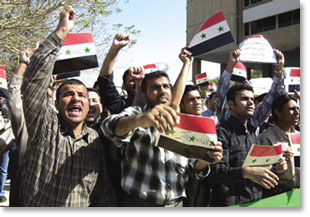FCNNEWSSOURCE
- Iraqi cleric warns UN not to back constitution (ABC News Online)
- Former President Carter: Blair and Bush: ‘Their war was based on lies’ (UK Independent, 03/22/2004)

(FinalCall.com) – Seven United States soldiers were killed March 12-14 and 19 were wounded, according to Army and U.S. officials, after a lull in U.S. military deaths and the guerilla-style warfare that has claimed close to 250 U.S. soldiers since President George Bush declared the war in Iraq was over in April 2003.
Iraqi civilians, meanwhile, continue to be struck down, caught in between U.S./UK forces and those fighting the coalition’s occupation. Five civilians were killed near the town of Baguba, 35 miles northeast of Baghdad, when a mortar hit their village, near a U.S. military base. On March 13, three Iraqis were wounded when an errant mortar-type bomb hit an apartment complex next to the Iraqi coalition’s headquarters in Baghdad, a U.S. military official told reporters.
And the body of a policeman from Fallujah, west of Baghdad, who had been reported missing on March 12, was discovered riddled with bullet holes, a police officer told the Associated Press.
Yet, the conservative think tank, The Conference on Foreign Affairs, released a report at Final Call press time stating that “significant progress” has been made in reconstruction and the political transition in post-conflict Iraq.
An editorial in the German weekly Die Zeit summed up the dilemma faced by the international community as it pertains to assessing the reality of Iraq. “With terror attacks on Shiites and indications of civil war from Kirkuk to Kerbela, the situation in Iraq confirms the view of the professional pessimists every day. Can it get worse? Professional optimists can also point to the situation in Iraq, because the government council has signed an interim constitution designed to back the country until August 2005. This is a success for the U.S. administrator. But whose view is correct?”
“The Iraq of today cannot be easily mapped onto a neat diagram of sect or political party,” Rahul Mahajan, author of the book, “The U.S. War on Iraq: Myth, Facts and Lies,” told The Final Call. He said understanding the relationship between Iraqi society and the Iraq state after three decades of Ba’ath Party rule is crucial to the success of the post-war reconstruction efforts.
An editorialist in Financial Times argues that the U.S. narrative of what is going on concerning the violence is portrayed as the action of terrorists who are targeting coalition troops and Iraqi security, as the June 30 date for the occupation’s formal handover to an interim government nears. “That looks to be a serious misinterpretation,” he wrote.
Nevertheless, the Coalition Provisional Authority is saying not to worry, because the armed elements of the old regime of Saddam Hussein that are still in Iraq, in large part leading the attacks against U.S. and UK forces, are hunted down every day.
Scott Ritter, author of “Frontier Justice: Weapons of Mass Destruction and the Bushwhacking of America” and the former UN weapons inspector in Iraq from 1991 to 1998, says that the anti-U.S. resistance in Iraq today is Iraqi in nature and more broadly based and deeply rooted than acknowledged.
“Though the Bush administration consistently characterizes the nature of the enemy in Iraq as terrorist, and identifies the leading culprits as foreign fighters, the notion that al-Qaeda or al-Ansar al-Islam are using Baghdad (or any urban area in Iraq) as an independent base of operations is far-fetched,” Mr. Ritter said.
But the spin doctors won’t quit. Dr. Mustafa Alain, an expert on Iraq at the Royal United Services Institute in London, says that “there must be a mastermind” behind the terror attacks in Iraq; “We are not talking about a group of amateurs.”
Furthermore, the U.S. media continues to portray the recent attacks on Iraqi Shiites as a deliberate attempt by elements linked to al-Qaeda to foment inter-community strife and civil war. Michael Ratner, president of the Center for Constitutional Rights, said the U.S. government is clearly desperate “to get some sort of cover for its naked aggression.”
So desperate that the Pentagon continues to pay $340,000 a month for “intelligence collection” to the political organization in Iraq led by Ahmad Chalabi, a member of the provisional government, according to the New York Times.
The story said that the U.S. government admitted that much of the information provided by the group before the war proved useless. A later review in early 2004 by additional government agencies concluded the same thing, the newspaper said. It was the Knight-Ridder newspapers’ group that broke the story that the payments, which were authorized by Congress in 1998, were continuing.
One other issue that is sure to provoke the ire of the opposition to the occupation is a little-talked about Article (59)c in the interim constitution, which says that the Iraqi Interim Government will be empowered to conclude binding agreements regarding the presence and role of foreign forces in Iraq. This means, according to analysts, that a temporary un-elected body, rather than the elected government, will sign defense pacts with the U.S. and its associates.
While Grand Ayatollah Ali Sistani said he strongly objected to un-elected bodies making any long-standing commitments on behalf of Iraq, observers say they expect the nation’s interim rulers will be under massive pressure to grant Washington whatever it wants on the military front.
Washington observers said that, after a month of acrimonious debate, the Pentagon, rather than the State Department, was put in charge of reconstruction, so the military, rather than the civilian agencies of the U.S. government, will be calling the shots when it comes to spending the $18 billion allocated to rebuild Iraq. According to analysts, Article (59)c essentially denies Iraq the most basic attribute of sovereignty: control over its own territory.
-Saeed Shabazz












